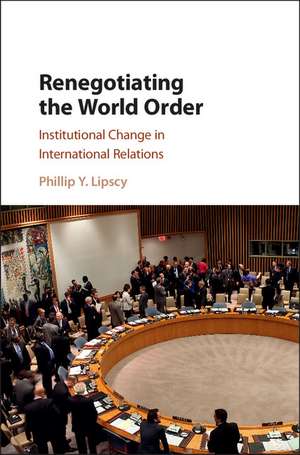Renegotiating the World Order: Institutional Change in International Relations
Autor Phillip Y. Lipscyen Limba Engleză Hardback – 8 iun 2017
| Toate formatele și edițiile | Preț | Express |
|---|---|---|
| Paperback (1) | 288.04 lei 6-8 săpt. | |
| Cambridge University Press – 13 iun 2018 | 288.04 lei 6-8 săpt. | |
| Hardback (1) | 627.66 lei 3-5 săpt. | +25.43 lei 4-10 zile |
| Cambridge University Press – 8 iun 2017 | 627.66 lei 3-5 săpt. | +25.43 lei 4-10 zile |
Preț: 627.66 lei
Preț vechi: 689.73 lei
-9% Nou
Puncte Express: 941
Preț estimativ în valută:
120.12€ • 124.94$ • 99.16£
120.12€ • 124.94$ • 99.16£
Carte disponibilă
Livrare economică 24 martie-07 aprilie
Livrare express 07-13 martie pentru 35.42 lei
Preluare comenzi: 021 569.72.76
Specificații
ISBN-13: 9781107149762
ISBN-10: 1107149762
Pagini: 338
Ilustrații: 32 b/w illus.
Dimensiuni: 158 x 235 x 22 mm
Greutate: 0.59 kg
Editura: Cambridge University Press
Colecția Cambridge University Press
Locul publicării:New York, United States
ISBN-10: 1107149762
Pagini: 338
Ilustrații: 32 b/w illus.
Dimensiuni: 158 x 235 x 22 mm
Greutate: 0.59 kg
Editura: Cambridge University Press
Colecția Cambridge University Press
Locul publicării:New York, United States
Cuprins
1. Introduction; 2. A theory of institutional change; 3. The International Monetary Fund and the World Bank; 4. Japan in the International Monetary Fund and the World Bank; 5. INTELSAT; 6. ICANN; 7. The League of Nations and the United Nations Security Council; 8. Policy area discipline: development institutions and regional integration projects; 9. China-Taiwan competition over international organizations: a placebo test; 10. Conclusion.
Recenzii
'Phillip Y. Lipscy shows, using rationalist theory, that variation in competition among international institutions explains variation in their willingness to undergo fundamental institutional change. Renegotiating the World Order is a theoretically innovative and empirically impressive book on an important topic.' Robert O. Keohane, Princeton University, New Jersey
'Why is it that some international institutional arrangements respond in flexible ways to changes in the distribution of power whereas others do not? Lipscy offers an original and persuasive answer to this question that troubles both policymakers and theorists. This book is a must read for anyone interested in understanding the past and future of international organizations.' Eric Voeten, Georgetown University, Washington DC
'How will rising states such at Brazil, China, and India seek to reshape the global order? Will they be responsible stakeholders working within the existing Western-led order, or will they be revisionists seeking to overturn it? … Lipscy provides the most elegant and systematic explanation yet for these diverse and shifting choices.' G. John Ikenberry, Foreign Affairs
'Lipscy's book provides well-written historical accounts with a compelling theory that provides both an academic case as well as fruitful insight for policy-makers.' Felicity Vabulas, Review of International Organizations
'Why is it that some international institutional arrangements respond in flexible ways to changes in the distribution of power whereas others do not? Lipscy offers an original and persuasive answer to this question that troubles both policymakers and theorists. This book is a must read for anyone interested in understanding the past and future of international organizations.' Eric Voeten, Georgetown University, Washington DC
'How will rising states such at Brazil, China, and India seek to reshape the global order? Will they be responsible stakeholders working within the existing Western-led order, or will they be revisionists seeking to overturn it? … Lipscy provides the most elegant and systematic explanation yet for these diverse and shifting choices.' G. John Ikenberry, Foreign Affairs
'Lipscy's book provides well-written historical accounts with a compelling theory that provides both an academic case as well as fruitful insight for policy-makers.' Felicity Vabulas, Review of International Organizations
Notă biografică
Descriere
This book explains how countries renegotiate international institutions when rising powers such as Japan and China challenge the existing order.
